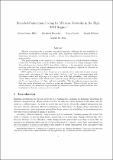| dc.contributor.author | Censor-Hillel, Keren | |
| dc.contributor.author | Haeupler, Bernhard | |
| dc.contributor.author | Lynch, Nancy Ann | |
| dc.contributor.author | Medard, Muriel | |
| dc.date.accessioned | 2014-09-24T19:54:56Z | |
| dc.date.available | 2014-09-24T19:54:56Z | |
| dc.date.issued | 2012 | |
| dc.identifier.isbn | 978-3-642-33650-8 | |
| dc.identifier.isbn | 978-3-642-33651-5 | |
| dc.identifier.issn | 0302-9743 | |
| dc.identifier.issn | 1611-3349 | |
| dc.identifier.uri | http://hdl.handle.net/1721.1/90330 | |
| dc.description.abstract | Efficient communication in wireless networks is typically challenged by the possibility of interference among several transmitting nodes. Much important research has been invested in decreasing the number of collisions in order to obtain faster algorithms for communication in such networks.
This paper proposes a novel approach for wireless communication, which embraces collisions rather than avoiding them, over an additive channel. It introduces a coding technique called Bounded-Contention Coding (BCC) that allows collisions to be successfully decoded by the receiving nodes into the original transmissions and whose complexity depends on a bound on the contention among the transmitters.
BCC enables deterministic local broadcast in a network with n nodes and at most a transmitters with information of ℓ bits each within O(alogn + aℓ) bits of communication with full-duplex radios, and O((alogn + aℓ)(logn)) bits, with high probability, with half-duplex radios. When combined with random linear network coding, BCC gives global broadcast within O((D + a + logn)(alogn + ℓ)) bits, with high probability. This also holds in dynamic networks that can change arbitrarily over time by a worst-case adversary. When no bound on the contention is given, it is shown how to probabilistically estimate it and obtain global broadcast that is adaptive to the true contention in the network. | en_US |
| dc.description.sponsorship | Simons Foundation (Postdoctoral Fellows Program) | en_US |
| dc.description.sponsorship | National Science Foundation (U.S.) (Award 0939370-CCF) | en_US |
| dc.language.iso | en_US | |
| dc.publisher | Springer-Verlag | en_US |
| dc.relation.isversionof | http://dx.doi.org/10.1007/978-3-642-33651-5_7 | en_US |
| dc.rights | Creative Commons Attribution-Noncommercial-Share Alike | en_US |
| dc.rights.uri | http://creativecommons.org/licenses/by-nc-sa/4.0/ | en_US |
| dc.source | MIT web domain | en_US |
| dc.title | Bounded-Contention Coding for Wireless Networks in the High SNR Regime | en_US |
| dc.type | Article | en_US |
| dc.identifier.citation | Censor-Hillel, Keren, Bernhard Haeupler, Nancy Lynch, and Muriel Medard. “Bounded-Contention Coding for Wireless Networks in the High SNR Regime.” Lecture Notes in Computer Science (2012): 91–105. | en_US |
| dc.contributor.department | Massachusetts Institute of Technology. Computer Science and Artificial Intelligence Laboratory | en_US |
| dc.contributor.department | Massachusetts Institute of Technology. Department of Electrical Engineering and Computer Science | en_US |
| dc.contributor.department | Massachusetts Institute of Technology. Research Laboratory of Electronics | en_US |
| dc.contributor.mitauthor | Censor-Hillel, Keren | en_US |
| dc.contributor.mitauthor | Haeupler, Bernhard | en_US |
| dc.contributor.mitauthor | Lynch, Nancy Ann | en_US |
| dc.contributor.mitauthor | Medard, Muriel | en_US |
| dc.relation.journal | Distributed Computing | en_US |
| dc.eprint.version | Author's final manuscript | en_US |
| dc.type.uri | http://purl.org/eprint/type/JournalArticle | en_US |
| eprint.status | http://purl.org/eprint/status/PeerReviewed | en_US |
| dspace.orderedauthors | Censor-Hillel, Keren; Haeupler, Bernhard; Lynch, Nancy; Medard, Muriel | en_US |
| dc.identifier.orcid | https://orcid.org/0000-0003-3045-265X | |
| dc.identifier.orcid | https://orcid.org/0000-0003-4059-407X | |
| dc.identifier.orcid | https://orcid.org/0000-0003-3381-0459 | |
| mit.license | OPEN_ACCESS_POLICY | en_US |
| mit.metadata.status | Complete | |
